I had the pleasure of participating in the 2/24/2011 #anCnoc Twitter tasting, hosted by @EdinburghWhisky and anCnoc. This first sample of the entry-level 12 year expression was generally approved-of, with tasters noting many fruits ranging from fresh spring berries to tropical fruits and flowers. The 12-year-old expression is aged in a mix of bourbon and sherry casks. Here are my notes from the event.
(Twitter tasting – 50ml sample courtesy of anCnoc (Knockdhu distillery) – 2/24/2011 #anCnoc twitter tasting)
Nose: First whiff is of raspberries and cream. Lemon meringue. Definitely honeyed. Light and floral. Later, I get a bit of peaches: perhaps peach schnapps. A drop of water revives the nose and pulls out lots of green apple.
Body: Light and unfortunately watery. Upfront are bananas dipped in caramel sauce, developing into dry haw or straw, and finally some bitter notes: not citrus but woody: green sap or freshly-cut pine or birch logs. A dash of water may amp up the sweet honey character.
Finish is initially sweet and caramel-heavy, which fades into honey and those bitter green sap and oak notes, which remain to the end of the medium length finish. Leaves me thinking about a bitter digestif – perhaps a hoppy aftertaste.


About The Distillery
Pronounced ‘an-nock’, this single malt is actually distilled at the Knockdhu distillery in Speyside. To avoid confusion with the Diageo distillery Knockando, Knockdhu’s new owners appropriated the name of the nearby hill Knock Hill (“An Cnoc” is the Gaelic) when they began bottling a single malt in the early 1990s. The distillery had previously been making malt for blending for the hundred years since its construction. Several streams arise on Knock Hill and provide water for the town of Knock, and for the distillery. Knockdhu uses tradtional worm tubs instead of condensers, which is said to promote weight and body to the spirit, along with sulphur and vegetable notes.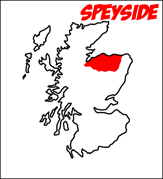


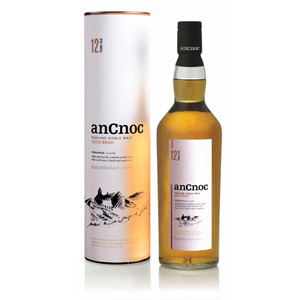
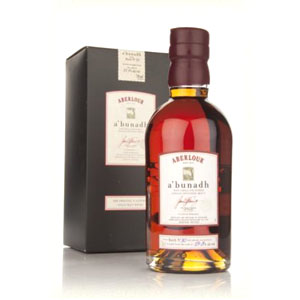

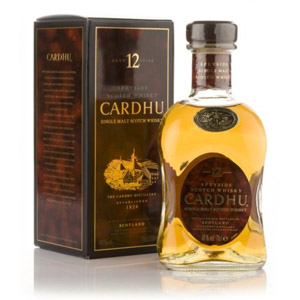
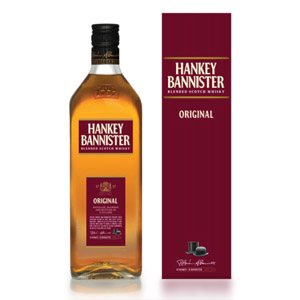
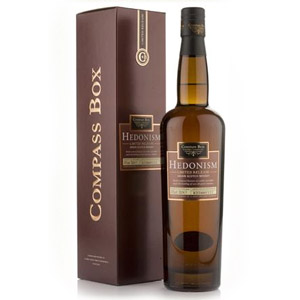
The anCnoc 12 yr is definitely the better when compared to it’s older sibling the 16 yr.
The only thing “entry-level” about this scotch is the price. The body is as full and bold as any scotch twice its price, as is the finish.
I can see how one could be confused with the finish, mistaking it for raspberries and lemon, but the true aroma is without doubt a slightly ripe tangerine, try it go get one.
Get it while you can at this price, it’s going to go up, you can bet on it.
Agreed…Once more scotch whisky drinkers find out this distillery I’m certain prices will rise; look at Balvenie these past few years.
I just polished another bottle of this, for you folks who might be thinking you’d like to buy a bottle and are wondering what it really tastes like, because the review of it given here is, well – worthless, it’s just another bit of so much hot air, that tells you absolutely nothing. After reading it you still have no idea what you’re in for if you buy a bottle, and you know darn well after you taste it, what you taste will be nothing at all like what the reviewers have said.
but I digrees, so in the spirit of brevity:
it taste like a sherry cask speyside.
it’s quite similiar to 10 year Macallan, which is a very popluar brand.
If you’re a newbie and not familiar with the taste of sherry or port cask flavor, buy one and try it, sherry/port casks have a very obvious flavor, after which when you are considering buy a new scotch, reserach it and find out if it’s been sherry cask’d that will put you light years ahead in knowing what it tastes like verses a bunch of silly reviewer tasting notes.
lessismore, If you’re going to continue posting adversarial comments like this on my blog, I would prefer you adopt a more civil, constructive tone. Calling my review “worthless” is not constructive. If you disagree with my conclusions – great! Let’s talk about it here. I’m not the kind of blogger that censors negative comments like this, as I enjoy having frank discussions in the comments section with my readers, but there’s only so much name-calling and “hot air” that I can tolerate. If you really can’t stand the way I review whisky, the solution is simple. Start your own blog!
As for anCnoc 12, I expressly did NOT think that this tasted like a heavily sherried Speysider, like Macallan. Nor should it – Macallan is aged exclusively in ex-sherry, while anCnoc (like Balvenie DoubleWood, Glen Rothes, and many others), are aged in a combination of ex-bourbon and ex-sherry casks. This gives them more of a lightly-fruited character, with more American oak flavors (banana, vanilla, etc.), and less of that dried/jammy fruit style. The malt and oak are also more apparent here than in a 100% sherry-aged scotch. I would not mislead readers by telling them that Balvenie DoubleWood and Macallan are similar, nor would I say this is similar to Macallan.
lessismore – what was the purpose of “polishing off another bottle” if you didn’t care for the previous bottle of anCnoc 12yr?
I thought I was being constructive, “worthless” just happens to be the word I thought best expressed my opinion, likewise with my term “hot air”, I guess I could have stated my case more gracefully but it wouldn’t have changed the meaning and would have only have to sugar coat it, which in all honesty isn’t honest.
Now then…. about anConoc 12, my telling someone that it is “SIMILAR” to Macallan tells them way more about what it taste like than your “dried/jammy fruit” – what does that mean ? how dried ? how jammy ? and what kind of fruit ? excuse me but that is about as ambiguous as saying it tastes like purple buttons.
You could have easily summed up your page of review and transfered a much more tangible result to the reader by simpley saying – it has a sherried flavor.
Everyone has to agree it has a sherried flavor, but many people would agree it taste like banana, why not a fudge pop, or a bacon cheesburger, or cherried road apples.
He who says least says most. – or as they say in these here parts – “just give me the straight skinny”
and please accept my humble appology I lose myself after the forth scotch.
You seem to be suggesting that I should change the format of my reviews from writing what I perceive in a whisky, to writing what anyone can find out by reading the back of the bottle. This whisky is partially sherried, partially matured in ex-bourbon. Sherry influence (especially when moderated by a certain percentage of bourbon casks) is not cut-and-dry, black-and-white. There are many different ways that sherry can influence a whisky. Macallan and GlenDronach are very similar, whereas Highland Park (which is also partially sherried) is altogether different. Something aged in a fino sherry cask, for example, tastes NOTHING like Macallan. I will not change the format of my reviews, which are as honest as I can make them. These are the aromas and flavors I find when tasting the whisky, in the best words I can find to describe them. I present as much factual information as I can find in the books I own and in a search of the web. Those two elements combined are the best effort I can make on this blog. If you don’t think my format is helpful to you, then I encourage you, and anyone of like mind, to look elsewhere for the type of review that you seek.
There is not doubt that there are different degrees sherry influences. But one would serve the reader well to spell them out in the review and stick with the facts, the simple obvious tastes that most people can agree on; apples taste like apples there’s no debate about that, verses getting into what one ‘perceives’ something to taste just isn’t all that helpfull because your banana is another man’s cauliflower and someone else’s mustard gas. But when you say it tastes like a mild sherry scotch – we’re all onboard with that, granted all sherry’d isn’t the same, but is gets us all pointed in the same direction and it sure beats saying it tastes like bananas and butterflys with a hint slighty soiled belly button lint.
And I do sympathize and understand that if you take out all the flowery words in a review than there really isn’t much to say, but do we read reviews just because we enjoy the sound of words or do we want some actual facts that inform us ?
Telling me it tastes like a sherry scotch no matter what degree it is, is a lot more informative than telling me one perceives bananas and cereal, what kind of cereal do they mean anyway – raisin bran, corn flakes, fruit loops ? ?
I’ve actually addressed this topic at one point: //scotchnoob.com/2013/03/11/i-dont-read-tasting-notes/
I think I do what you suggest already. I always make a point to include as many facts as I can find about the way the whisky was made and which elements contributed to its flavor. In the section above the tasting notes, I include the barrel(s) used, any interesting facts on age, type of distillation, amount of peat, location of aging, etc., that might influence the flavor of the whisky – as much info as is possible to find by dredging the Internet, anyway, since often that info is kept secret by the larger spirits corporations.
Again, if I smell blueberry pancakes and hot asphalt in a whisky, I’m going to say that. This is a blog about my experiences tasting whisky, and that’s what I provide. I encourage you to read the upper section of reviews and skip the tasting notes. That’s what I do when I read other peoples’ tasting notes, as I mention in the above link.
PS: sorry for my above grammar and spelling – it’s getting awful late here
A one point in time, using CERTAIN terms to describe things was needed and served a purpose, and even then only by people in the industry who needed to communicate the REALITY of what a beverate tasted like. The most basic example of what I’m talking about are the terms ‘sweet’ and ‘dry’ When dealing with wine, certain simple tastes were used to further define, like cranberry for a Rhone Wine or cherry for Rioja, and just one word or two to put the idea across, there was a purpose for that, and those few words conveyed the idea. And people in the industry knew what was ment by those few and simple words.
HOWEVER, today the whole think has gotten’ out of hand and is so ridiculous that no knows what anyone else is talking about any more. And the original concept of tasting notes has been perverted and lost. It’s not about what ‘you’ think it tastes like, but what it really does taste like. The was the original intend of tasting terms, and one could actually convey to others that actual tastes of things.
Now-a-days everyone is out to impress you with their pallet prowess.
@trythis That is an excellent point, and totally correct. It could also be said that those industry terms (sweet vs. dry vermouth, for example), which made a lot of sense to the industry types only served to confuse customers who ended up exposed to those words. “Dry?? It’s a liquid, how can it be dry?”
I do take some exception to your assertion that everyone who writes modern tasting notes is out to impress people with their palate abilities. I personally am trying only to convey what I think about the products I taste, in the only words I can find to express them. If I say something tastes like strawberries, I’m not asking you to be impressed with my ability to taste. I’m trying to convey that I think this whisky has a fruity note that, TO ME, tastes like strawberries. I can’t say it any plainer than that, and there’s nothing sinister here. If I totally avoided using flavor and aroma descriptors when writing about whisky, these posts would be extremely boring. “Tastes like whisky. Oh, and sherry.” Blah. Who wants to read (or write) that?
I know its an old post, but i have to say i like when a reviewer compares and goes from the general to the precise. For example, it helps me when i talk about the glengoyle12 to refer to the balvenie DW. Its like a DW with more of this and that… Also, general comments: partly sherried, citrucy, appley etc., before the more poetic comments.
Hi Anonymous, thanks for the comment and suggestions. This actually gives me an idea – I really ought to (or try to; it’s hard) include a general “flavor camp” on each review like Dave Broom does in his World Atlas of Whisky. Still, it’s a daunting task to go back through nearly five years (!) of reviews to add this. I’ll put it on my to-do list. 😉 Thanks!
Of course the word ‘dry’ means dry – but it was/is a term that everyone knew and could agreed on what was ment by it, unlike the use of such terms as cookie batter – which can mean anything to anyone.
Well if everyone who writes modern tasting notes isn’t out to impress – they are certainly do a great impression of one who is. And beside what person when confronted with it would own up to it. And no one wants to beleive that about themselves, yet they are.
Dear Noob, you are making my point for me in your second paragraph…
“I’m tryng to convery that I think” – THINK, some people think big foot exists, some people think they hear bells when the fall in love – what you think doesn’t matter, it’s not reality – I really shouldn’t have to explain this….gooly
You go on to say that you use ‘strawberry’ to identify fruity. Why ? just say fruity, just say sweet. Saying strawberry puts an unrealistic impress in the readers mind that they will taste strawberry, which is only what, as you admit, you THINK it tastes like, However if you say fruity, most tastetd would agree and say – Yea it’s fruity.
And finally you admit that you don’t want your reviews to sound “boring” – I rest my case !
You than say “Who wants to reat that” – I do, lots of people do – we want to know what it tastes like, NOT what anyone THINKS it taste like, If you can say it in one word – perfect ! the fewer words the better. And leave the bloviating to the real pros, those pompous bags of wind like Robert Porker.
We are clearly going to continue to be in disagreement on this. I write a blog. This is an unofficial, amateur, non-journalistic publication that contains the opinions and experiences of me, the author. This blog exists solely for me to write about what I THINK about the products I taste. I am not selling literature or subscriptions, nor am I asking to be called an expert or a professional. You seem to be confusing my blog with publications like The Whisky Bible, Whisky Magazine, or Michael Jackson’s books on Single Malt Scotch, which must be held to high standards of objectivity, as they represent the journalistic body that represents and reports upon the scotch whisky industry, such as it is. Honestly, you represent the solely dissenting voice in my readership, the rest of whom appear to enjoy my writing, and I wish you luck in your mission to rid the world of whisky reviews that use words to describe flavor and aroma.
I must say that I do respect your ability to take a punch – tipping my hat.
I would say that there is a difference between fact and fiction. And I conceed defeat I was confusing my facts with your fiction (left jab)
And I’d be the first to say that there is a place in the world for fiction writers. So have at it. (over hand right)
I do respect your tone and open mindedness, most people would have tossed me off their site by now, I’m sure we’d have a lively debate over a pour, argue and disagree but come away with a few laughs and a friendly smile.
cheers my friend, I respect your constitution
In/re tasting notes. Rule #1, taste for yourself, while entertaining, most notes are exercises in self-gratification. (Though I love reading them)
Try this: Pick any scotch. Collect tasting notes from any 10 different sources for that scotch. Give the nameless-notes to a scotch-savvy friend and ask him to try to identify the scotch(es) based on those tasting notes. I can guarentee he will name at least 8 different whisky’s though they all describe the same dram. Then, take every note thereafter with a huge grain of salt.
Update…The anCnoc 12 yr still remains 1 of my favorite daily drams…Even better is that it’s very affordable, and the quality/consistency appears to remain between batches from a few years ago to today, and that’s a good thing!
Holy crap – poor Noob. Why are you guys taking shots at our host? He has done more to educate newbies and experienced Scotch drinkers on the finer points of variety and taste than almost any other site I’ve seen. Lighten up on the guy! If you don’t like his reviews, go elsewhere! It’s scotch. It’s supposed to be enjoyable, not a land mine. I agree with maybe 87.9% of the Noob’s reviews. The remainder, I get over! Zounds. Give a Noob a break.
Thank You Ben and Thank You Snob…keep it up.